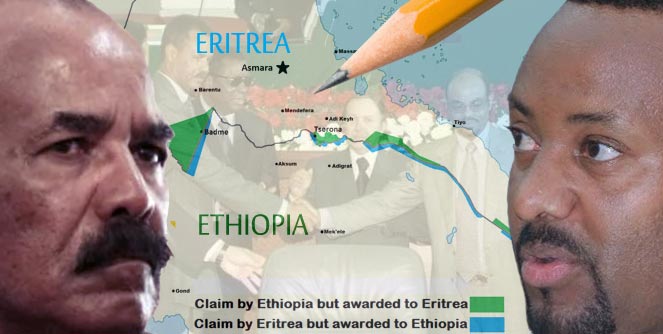Eritrean National Congress: 50 Years In The Making, Finally Here

The Eritrean National Congress, which was mandated by the Eritrean National Conference for Democratic Change (ENCDC) last year, is expected to convene on November 21 in Addis Ababa, Ethiopia. The 53-member commission, which was elected by the Conference, is expected to organize the congress of 553 Eritreans representing the civil society (60%) and political parties (40%.) Among the challenges facing the Commission are the same ones that have bedeviled the Eritrean Democratic Alliance (EDA), the umbrella organization of the exiled opposition, for the last 10 years: what are the minimum requirements that a civil society or a political organization has to meet before it calls itself one? What are the admissions criteria? If representation is based on size, how does an organization demonstrate its size?
Of course, we didn’t have this problem during Eritrea’s revolution: the ELF and the EPLF both claimed that they were the “sole representative of Eritrean nationalism.” This is because, according to them, the people weren’t “conscious” enough to handle choices. Not just the people, even the rank and file of the ELF and EPLF could not be trusted to make the right choices, so the two parties went about creating “labor parties” in secret to steer their vanguard organizations. You will recognize them now: these are the people who, contrary to all the facts, called last year’s national conference a “failure”; and these are the people that are hoping and praying that the national congress will fail and they have been spinning the postponement of the meeting as if it were a crisis. Those who still harbor fantasies of the “good old days” when people’s choices were limited—and the outcomes were always scripted—are, for all their talk about “people power”, always horrified by a spontaneous and unscripted gathering of Eritreans.
But the people do have a choice—including the choice to opt out of the national congress and join the alternative scripted coalition that has been established (coincidentally, of course) on October 14—a week before the date the Congress was scheduled to commence before its postponement.
Minimum Requirements
What must a political organization do to establish credibility and demonstrate that it is viable? This is one of the questions that the EDA attempted to tackle for years, and the same one that the Commission is facing.
The organization must have an organizational congress and a political program, was one of the proposals of the EDA. But what are the minimums of an organizational congress: can it be an online meeting? A conference call? A skype session?
It also has to have a presence was the other suggestion. But what is presence: a headquarters office with branches? An organizational chart? Dues-paying members? A website?
If the number of delegates are going to be proportionate to the size of the organization, how does the organization provide evidence of its size? What if it insists that its membership rolls are confidential? What is to stop 3-man organizations from calling themselves organizations and getting the same number of delegates as organizations hundreds times their size?
On top of all of the above, the Commissioners are facing a challenge that the EDA didn’t: sifting through applications to categorize them as “civil society” or “political organization.” This is not an easy task given that there is a revolving door between the two: individuals moving in and out and into these organizations.
Given all these issues which have never been resolved satisfactorily—and, in our opinion, are not likely to be given that every new actor wants to challenge established norms—we commend the EDA and the Commissioners for working in concert in an attempt to manage the challenge. It is a good thing that those who withdrew from EDA did when they did because if they were still part of the Eritrean Democratic Alliance, this would have been their moment for staging walk-outs and flooding the Internet with valentine cards addressed to themselves.
Party Proliferation
In its January 2009 elections, Iraq saw 300 political parties compete for power. Countries emerging from (or trying to replace) single party states generally overcompensate for it by having too many political parties—and Eritrea is, apparently, not an exception. The 553 individuals planning to attend the congress include 3-man associations, and other groups whose membership extends to the thousands. It includes organizations that have been around since 1961 and groups that were formed in 2011. It includes groups organized on the basis of a national platform, and groups organized on the basis of provincial focus. It includes groups organized on the basis of national identity, religious identity and linguistic identity. The proliferation has gone beyond language to accent of language.
Many find this messy and even semi-chaotic—and it is. But democracy is messy, and the alternative is to have paternalistic organizations act as guides—and we have seen how well that turned out. It is our experience that whenever a diverse group of Eritreans have gotten together and they were given the space to dialogue and debate, they have always come out with an agreement, and our expectation is that this will be no different.
This is, after all, a National Congress—and in a congress it is important that nobody feels left out or excluded. Particularly when one of the objectives of the congress is to debate a transitional charter: a constitution. Isn’t the biggest criticism against the 1997 constitution drafted by the PFDJ that it represented only the vision of the PFDJ—and, despite all the so-called “people’s meeting”, the final version of the constitution was no different than the one which had been penned by the PFDJ Commission?
It would be well for all attendants to remember that party proliferation does not necessarily translate to political pluralism. In fact, it is a recipe for creating an ungovernable state. The Pencil has spoken often of the importance of consolidating groups. At some point, these small groups have to gravitate towards like-minded groups to create larger groups which, in politics, is the only currency: size of the constituency. We hope they realize their situation and not attempt to serve narrow personal interests. Many of these groups, which are just created for the purpose of attending the congress will, no doubt, dissolve after the congress. However, this process must be natural and organic: history suggests that forced mergers always end up in splinters and premature partycide always breeds resentment.
Capacity
While we admire the ability of the EDA and the Commission to resolve their differences amicably, we regret that this has resulted in a postponement of the congress which has inconvenienced many people. The last time the commission and the sponsors arranged the seminar, the management of logistics left much to be desired. We hope that this time around, the travel arrangements will be seamless unlike the chaotic arrangement of the seminar that was held in September. People are not bags that can be shipped just by dropping them at the nearest post office. Dates need to be fixed ahead of time. Tickets and reservations must be arranged ahead of time: even the full time activists cannot afford to travel on such a short notice let alone people who have responsibilities.
This, of course, is related to funding, and the capacity of Eritreans to finance their congress. In every gathering of Eritreans, there are always big-talkers who promise to raise the required funds—but they don’t deliver. Many had also thought that the Sana’a Forum (Ethiopia, Sudan, Yemen) would be able to fund the congress entirely. They will not. And it is upon the commission (with collaboration with the EDA), the attendants, and individual Eritreans who have to come up with some funds to cover part of the expenses. Even the collection of the $150 registration fee for the right of voting and election was not successful in some parts. Some regions have managed to cover the travel cost of their representatives but there is hardly a surplus fund to help the commission since even the $150 fee was being negotiated until recently.
In about a month, the long-dreamed-of Eritrean national congress will be held. This is, of course, a preview: the real congress will be held in liberated Eritrea, following the collapse of the PFDJ. We commend the Commission and the EDA for pulling it off: no matter what its detractors may say, it will accomplish something that no other political organization has to this date: a gathering of a large, diverse group of Eritreans who will be able to speak freely about their vision for future Eritrea. Neither the ELF, nor the EPLF (with their vanguard mentality), nor the PFDJ (with its affinity for “seminars” where people listen and clap), nor its detractors (a monochrome of people with uniform views on everything) can match this accomplishment. In the next edition of the Pencil, we will share our recommendations for what we hope to see from the Congress.


Awate Forum